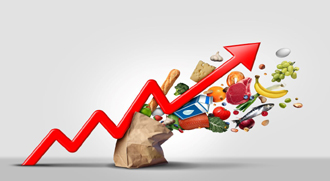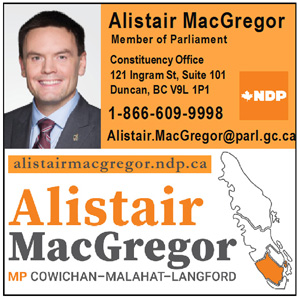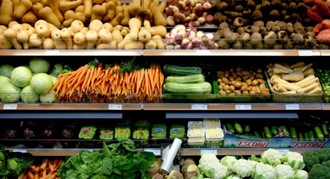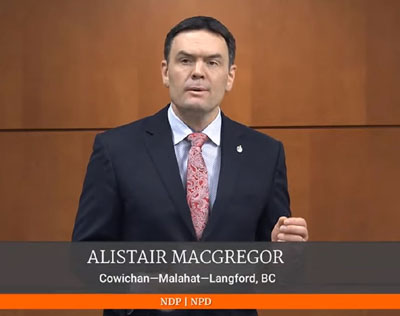
Tuesday February 14, 2023 | NATIONAL
Sociopolitical analysis by Mary P Brooke | Island Social Trends
CANADA’s AGRICULTURE DAY: FEBRUARY 15, 2023
Last night members of the House of Commons Agriculture and Agri-Food Committee unanimously passed a motion to summon the Presidents and CEOs of the three biggest grocery chains in Canada: Empire, Loblaws, and Metro to answer for their profit-driven inflation of food prices.
The motion was put forward by the NDP’s new Food Price Inflation Critic Alistair MacGregor, who has also been the Agriculture and Food Critic since 2021. MacGregor is the only NDP MP on the 12-person Agriculture and Agri-Food Committee (AGRI).
Extending an NDP-initiated investigation into high food prices and corporate greed is a key political move to continuing the political fight for everyday consumers.
The five biggest grocery chains control 80 per cent of all the food people in Canada consume – and the government has not intervened in those companies to set food prices.
Of note, locally on Vancouver Island, Country Grocer with seven of their own stores just bought 49th Parallel Grocery which has four island locations.
Food profit has doubled since the pandemic:
Food retail profit has doubled since the COVID-19 pandemic, as shown in a presentation by economist Jim Stanford during the committee meeting last night.
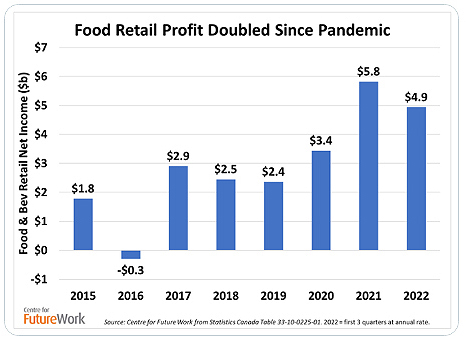
Grocery chains may argue that food supply chain interruptions and retaining staff are two factors for increased prices. But the AGRI committee has yet to hear that or any other reasons.
MacGregor’s February 14 statement:
After his motion in the AGRI committee went through, MacGregor made this statement:
“Canadians are cutting back on their usual grocery lists and stretching their paychecks even further to get less for their families. But all the while, these grocery CEOs are making more money than they ever have before. It just doesn’t add up.”
“After CEOs of Canada’s largest grocery chains snubbed the NDP-led investigation on the rising costs, we’re now compelling them to testify, so we can get real answers for you on why your bills are going up.”
“When Loblaw froze the prices on all No-Name products, Canadians saw firsthand that these companies do control the markup on food prices. Now they’ve lifted the freeze, and our families are bracing for the steep increase.”
“The Liberals have refused to hold these grocery giants to account. The Liberals could introduce a tax on excess profits – taking away the incentive to gouge you. And the Conservatives only want to make it so that grocery corporations pay even less tax on their huge profits.”
“While Conservatives and Liberals side with grocery giant CEOs, New Democrats are getting to the bottom of high grocery bills and fighting to get those prices down.”
New critic for food price inflation:
MacGregor is the MP for Cowichan-Malahat-Langford, and just 10 days ago was appointed as the NDP’s Food Price Inflation Critic by NDP Leader Jagmeet Singh.
“Families are taking food out of their grocery carts and stretching their budgets as far as possible to try and keep up with their rising food bills. But still costs are going up,” said MacGregor.
“Grocery CEOs are making more money than they ever have before, and yet while working Canadians are the ones asked to make sacrifices when deciding to pay food or rent, as their wages aren’t going up. It doesn’t make any sense, and Canadians deserve answers from the big CEOs profiting off of food.”
In the fall, the NDP forced all members of parliament to admit that corporate greed is fueling inflation, and to investigate grocery chains who are getting rich off the backs of Canadian workers. Loblaw temporarily froze the prices of No Name products at record costs – proving that rich CEOs have all the power to control food costs for families. Now, they’ve lifted the freeze, and people are bracing for steep price hikes.
Core inflation was 6.3% in January, which is lower than the 8.1% seen in June 2022. Food inflation remains over 11%. But the Bank of Canada may yet increase rates if the economy does not continue to cool. A small interest rate increase announced January 25 still delivered an economic shock.
Household debt:
Extraordinary levels of household debt is nothing new. Over the past 40 years the gap widened significantly between the upwardly mobile and the rest of the middle class that has over time become the working class.
The ease of online business (supporting e-commerce and ‘fintech’ industries) and globalization of businesses and trade allowed a fast curve upward for some, while the rest fell further and further behind in terms of opportunity and leverage.
This year, after a year of unrelenting inflation, the average consumer debt load was recently reported as 183.3% (third-quarter 2022-2023), up from 182.6% (second-quarter), which means that against each dollar earned there is about $1.83 owing.
Pre-pandemic, the debt ratio hovered in the range of 1.70% to 1.78%, in an economic environment that had somehow become normalized. Public voices are finally being heard by politicians, seen as most relatable in discussions about grocery prices. But that’s just the tip of the problem, as the high cost of living impacts livability across the board including housing, Internet/wireless, transportation and child care.
As reported by CTV mid-December 2022, the total amount of household credit market debt, which included consumer credit, and mortgage and non-mortgage loans, grew 1.2% to reach nearly $2.8 trillion in the third quarter including $2.07 trillion in mortgage debt while non-mortgage loans totaled $722.6 billion.
===== RELATED:
Alistair MacGregor leads NDP investigation into high food prices (Feb 13, 2023)
BC food security direction includes watchful eye on California (Feb 6, 2023)
Alistair MacGregor welcomes Jagmeet Singh at Belmont Secondary (Jan 26, 2023)
Alistair MacGregor into 2022: soil conservation, RCMP reform, addiction as health & social issue (Dec 30, 2021)
Island MP Alistair MacGregor introduces national soil health strategy bill (Apr 26, 2021)
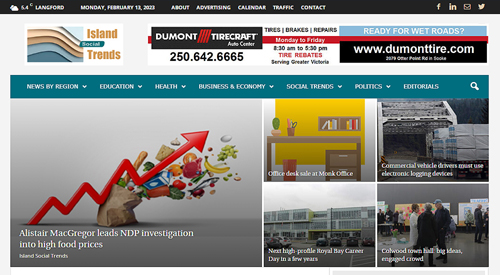
===== ABOUT THE WRITER:
Mary P Brooke, B.Sc., Cert PR is a long-time journalist, delivering news through a socioeconomic lens through Island Social Trends.
Based on the west shore of south Vancouver Island, her publication IslandSocialTrends.ca covers news of the Greater Victoria area, south Vancouver Island, with insights on BC and national issues.
Ms Brooke has consistently covered progressive politics on Vancouver Island including a focus on food security for the South Vancouver Island region.
Among many other credentials, Mary Brooke holds a B.Sc. in Foods and Nutrition.
ARCHIVES: POLITICS | VANCOUVER ISLAND | FOOD SECURITY | BUSINESS & ECONOMY
HOW TO SUBSCRIBE to ISLAND SOCIAL TRENDS: Free ENEWS | Premium Subscriber/Sponsor



